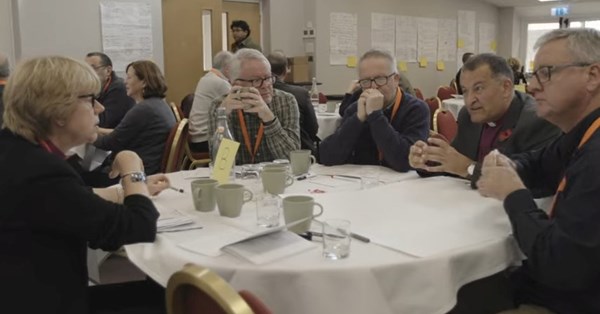ANY responses that the Bishops made to the Living in Love and Faith (LLF) process had to land within the bounds of two unavoidable realities.
First, no observer who has examined the election addresses that the General Synod members were elected on believes that there are the requisite two-thirds majorities in all three Houses to change the marriage canon.
Second, disciplining or discriminating against laypeople or clergy in faithful and legally covenanted same-sex relationships now provokes enormous hostility, both in the pews, among the wider public, and among MPs and peers.
Even among some churchpeople who are themselves unconvinced by the case for equal marriage, there is disquiet at the idea of barring from appointment clergy who have married someone of the same sex in good faith and Christian conscience. Reading between the lines of the Archbishop of Canterbury’s carefully worded statements — for example, during last Friday’s press conference to announce the Bishops’ proposals — it is most likely that he himself falls into that camp.
THE Bishops’ proposals (News, Leader comment, 20 January) still do not paint the full picture of how the Church of England will deal with same-sex partnerships, assuming that they survive intact the debate about them in the Synod.
In particular, those who are sceptical of these proposals will be concerned at what the still-to-be-drafted guidance that will replace Issues in Human Sexuality will consist of. Those concerns will come from both affirming and traditionalist quarters. This topic will doubtless consume time and energy at the meeting of the Synod next month. The language used by bishops and archbishops in interviews last week, however, seems to have made it clear that it will no longer be a disciplinary matter for clergy, including bishops, to enter same-sex civil marriages.
What stands out to me in the material produced last week, however, is not the narrow issue of whether or not same-sex marriages should be solemnised in our churches, but the substantial sections which indicate that the Bishops understand that English society, and Western societies more generally, are in the advanced stages of a revolution in the understanding not only of marriage, partnerships, and sexual expression, but of sex, gender, and the core of human identity.
Christians who are discussing sex and sexuality in our society may well choose to reject all or parts of that revolution. I am not convinced by all of its precepts myself. Yet even those arguing against these radical changes in self-understanding must engage constructively and respectfully with them, and particularly their underlying principles of equality, or they will find themselves speaking into a void. Bishops, from the full spectrum of Church of England opinion, have clearly thought it best to engage with the new cultural reality.
It is notable that some progressives have reacted with real anger to the proposals, while more conservative Evangelicals and Anglo-Catholics have expressed their opposition in much less emotive terms. Partly, that response is conditioned by reports in the secular press which simply assume that any failure to marry same-sex couples is immoral bigotry as egregious as a refusal to marry mixed-race couples. This is so even though the State has performed same-sex marriages for less than nine years, and is part of the new reality that Christians must, one way or another, engage with.
In a strange way, however, that angry progressive response is helpful to the Bishops, because it helps what are radical proposals land more gently at the conservative end of the Church, especially among laypeople who will largely form their views from what they read in The Telegraph or The Guardian and hear on the BBC. That media environment also helped the remarkable outcome at the Lambeth Conference last year to land with surprisingly limited domestic or international backlash (News, 5 August 2022).
IN THE longer term, LLF’s real impact may not be through same-sex couples’ getting their marriages blessed in mainstream central-to-Catholic parishes that have long been as affirming of same-sex couples as policy allowed them to be. It might, instead, be at the Evangelical end of the Church, where a steadily growing number of parishes and clergy are adopting policies that affirm faithful same-sex relationships, and where there is no longer any formal church policy acting as a bulwark for the status quo.
Some years down the line, and perhaps not too many, it is likely that the General Synod will vote on whether to solemnise same-sex marriages in Church, and that might prove a rocky moment for its unity. For the moment, the Bishops will rejoice in the return of the Anglican genius for being “all things to all men” (1 Corinthians 9. 22). Simultaneously, everything has changed, and nothing has changed, and, for the moment, it seems that the unity of the Church, both domestically and internationally, has been largely preserved.
For Archbishop Welby, it represents a real triumph, as did the outcome of the Lambeth Conference, although the angry internet-driven tribalism of the 2020s means that it might be some time before that becomes obvious to some.
The Revd Gerry Lynch is Assistant Curate of St John and St Mary, Devizes, in the diocese of Salisbury.
Credit: Source link




